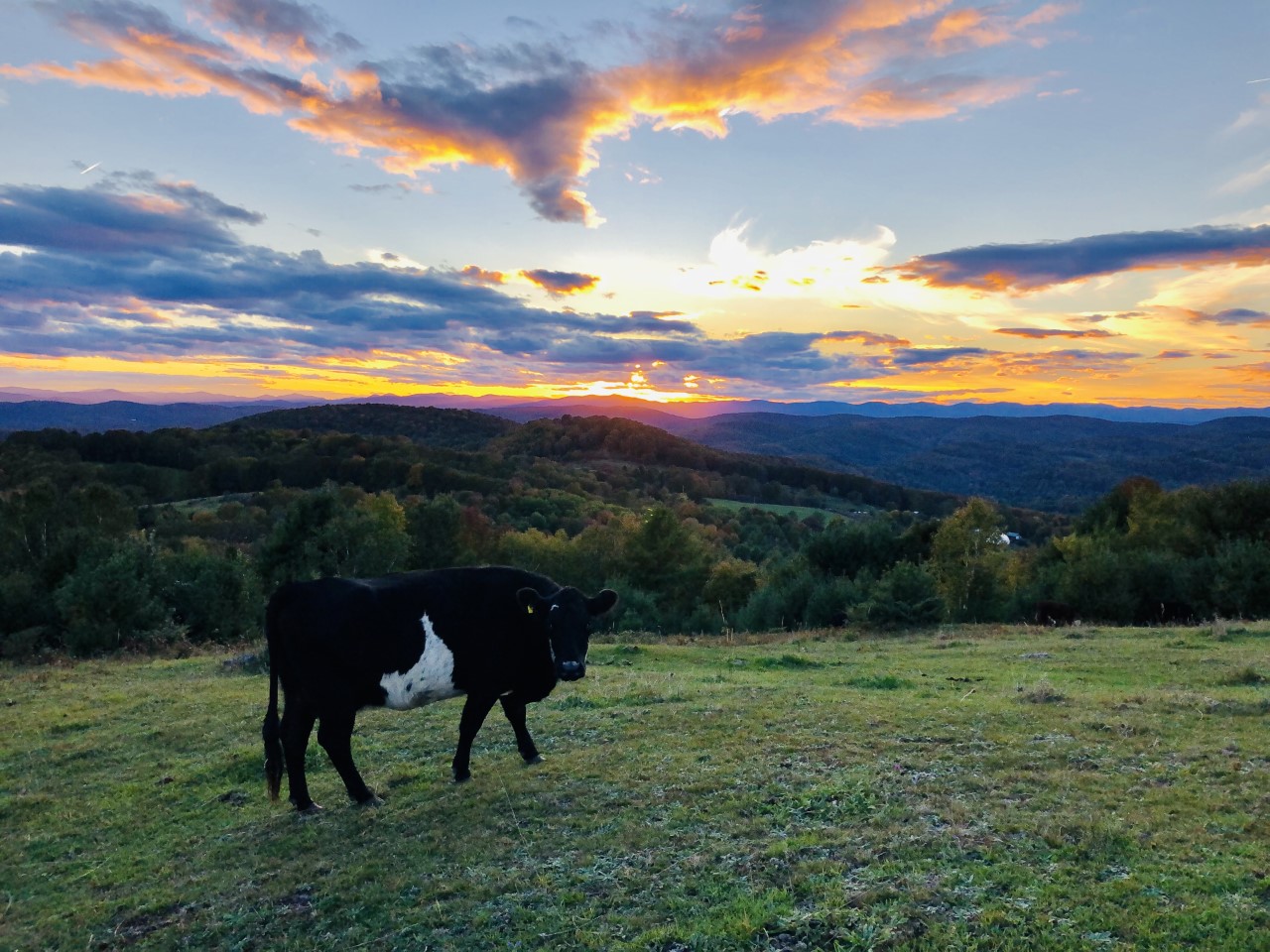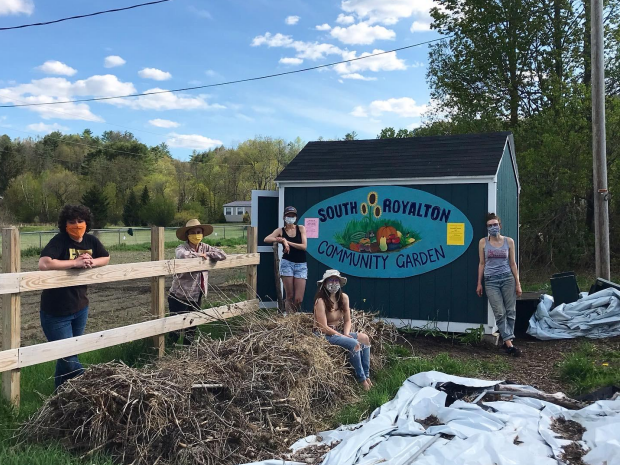Whether it is affordable housing, community development, conservation and recreation, or food resilience, the 4-Town Coalition consists of movers and shakers making things happen in Royalton, Sharon, Strafford, and Tunbridge.
The 4-Town Coalition is a grassroots and volunteer initiative that came to life originally in response to an out-of-state developer who planned to build the New Vistas project in 2016, a gated community at the site where the four rural towns of Royalton, Sharon, Strafford and Tunbridge meet. A local organization, the Alliance for Vermont Communities (AVC), formed to band together to fight this development. Once it was clear that the development was unlikely to go forward, AVC, in collaboration with the Selectboards and Planning Commissions of the 4 Towns reached out to the Vermont Council on Rural Development (VCRD) to facilitate a community-led process to envision what the four communities wanted their future to be.
“The Alliance for Vermont Communities (AVC) was delighted to work with VCRD on the 4-town visioning process. We had been working hard to bring together the four communities in fighting New Vistas and VCRD helped us focus on a positive vision for our communities moving forward,” explained Jenn Hayslett, Vice President of Alliance for Vermont Communities.
In 2019, community members from all four towns came together, for the first time, as part of VCRD’s Community Visioning Process, and set three priorities to work on: Housing and the senior community, conserving natural resources & building an agricultural network, and supporting economic development.
More than 300 community members volunteered to support these efforts. Following the Community Visits, community members quickly began raising their hands to join volunteer efforts. With the help of many volunteers, local projects were able to take off fairly quickly around the expansion of local trails, farm and homesteading workshops, a network for farmers, and much more. Several of the projects were able to win grant funding.
In the Spring of 2021, the 4-Town Coalition Steering Committee decided to take things even further by applying for an AmeriCorps VISTA, realizing how impactful it would be to have a designated point-person for this all volunteer network. By August 2021, Meghan Asbury had joined the efforts as the 4-Town Coalition Coordinator as an AmeriCorps VISTA.
“I was wrapping up graduate school in Urban and Environmental Planning, searching for community-focused work, when I stumbled upon the position through AmeriCorps VISTA,” says Asbury while smiling and thinking back. “I thought, this is an amazing opportunity – so here I am.”
The 4-Town Coalition Coordinator position is hosted by the Green Mountain Economic Development Corporation (GMEDC). GMEDC is the local Regional Development Corporation and covers all four towns, making the partnership a perfect collaborative effort between GMEDC and the local communities.

Since 2020, the communities’ priorities for action have evolved as the world has shifted and new opportunities have presented themselves. The committee working on housing and senior communities grew to focus on affordable housing, in part as a result of the new Working Communities Challenge (WCC). This program is supporting 14 towns in the White River Valley, including the 4 towns of the Coalition, to build new systems to take on enduring challenges like housing and workforce challenges with support from the State of Vermont and the Federal Reserve Bank of Boston. This provides an opportunity for the members of the 4-Town Coalition to continue working together on housing, in collaboration with additional neighboring communities and with paid professional support.
A second goal of the Community Visit process was to conserve natural resources and the working landscape and create a regional agricultural network. Because this is a broad priority that encompasses several related but distinct goals, over time this committee has split into several projects.
Preliminary discussions around forming a regional agricultural network increasingly focused on the need to help farmers access land affordably. When the community was presented with an opportunity by the sale of a dairy farm with important agricultural, natural resource, and historical significance, the White River Land Collaborative was formed. The WRLC is a farmer-led, community-driven project that aims to provide young farmers affordable land and housing, along with additional technical support. The project has created a new governance structure for more accessible land use, and strives to also build new community connections over time as well.
In selecting a priority around the working landscape and agriculture, the community also intended to support all residents, whether farmers or not, in regeneratively stewarding their land, in having the opportunity to grow their own food, and in participating in a local food system. The South-Royalton Community Garden, which provides community members the option to rent individual plots or contribute to the volunteer garden, has been from the beginning a core member of the 4-Town Coalition. The Garden and other Coalition volunteers together formed the Food and Farm Resilience Committee to conduct a needs assessment, provide workshops for the community, and plan shared services and infrastructure for both homesteaders and area farmers.
The Committee also elaborated on its vision of conservation of natural resources and began to focus on the intersection of conservation and recreation. With tremendous volunteer support for marking trails, creating maps, and working with property owners to ensure trails maintain their public access, the regions of the 4-Town Coalition are becoming a prime destination for outdoor enthusiasts.
The third and final priority, where the four communities elected to focus on economic development, has helped focus attention more recently on the North Tunbridge General Store. There is currently no store in Tunbridge, and providing basic services locally is important to residents. The re-opening of the North Tunbridge General Store continues to be a collaborative effort with the 4-Town Coalition, the Gross Family, Vital Communities, Preservation Trust of Vermont, and GMEDC. Thanks to the Gross family and these community partners, residents are eager for the opening day of the general store this summer.
There certainly isn’t a lack of new ideas, projects, or initiatives within the 4-Town Coalition, and everyday community volunteers show up to make a difference in the place they call home for the future of Vermont. Recently, GMEDC and Vital Communities came together with other local and regional leaders to form the Upper Valley Chapter of the Vermont Welcome Wagon Project to help new and returning Vermonters find community in the beautiful Upper Valley.“People continuously showing up both virtually and in-person is true momentum. The last 2+ years have been physically and emotionally challenging and everyone is exhausted – but they still show up for their community,” says the Americorps leader Asbury.
And of course, a great deal of work continues on these impressive projects. Priorities like Food Resilience are embodied in the South Royalton Community Garden and White River Land Collective projects, and grant applications are also being submitted for increased trail work and trail kiosks.
While highlighting how far the 4-Town Coalition has come since 2020, Asbury reflects on her time as part of the transformational work. “Being with people who are so dedicated to their community is absolutely wonderful, and when we get to meet in person it’s even better. I had winter meetings with a Steering Committee member from Stafford that culminated in him teaching me how to cross country ski, which was an advantage to enjoying all that our four towns have to offer.”
VCRD’s Community Visit process is a way for towns throughout Vermont to engage and bring together members of the community, their ideas, set goals and direction, while having access to resources that will help take action on set goals.
“The work and credit belongs entirely to the strong local leaders in the four communities,” says Brian Lowe, executive director of Vermont Council on Rural Development. “These communities came together to define local priorities for themselves and to shape their future together. What they have accomplished already is impressive.”
When asked if she would recommend other communities in Vermont to participate in VCRD’s Community Visit program, Asbury exclaimed, “Go for it! Just remember that volunteer initiatives can only move so fast, and communities interested in this process should look for opportunities to compensate volunteers and hire staff wherever they can.”
Photos provided by 4-Town Coalition.

